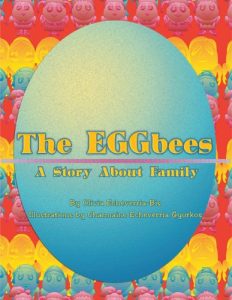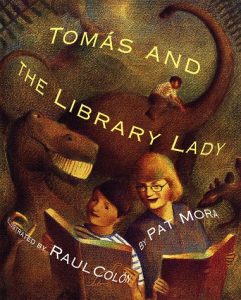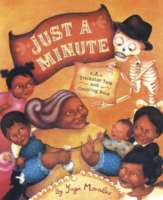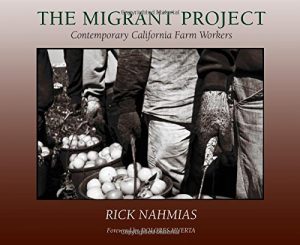
Interviews with nine children of Hispanic migrant farm workers reveal some of their struggles, such as the long hours in the fields and the language barriers at school, and their aspirations for a better life.

Interviews with nine children of Hispanic migrant farm workers reveal some of their struggles, such as the long hours in the fields and the language barriers at school, and their aspirations for a better life.
 The EGGerson family lives on a planet called NEGGarus in a galaxy far, far away. On NEGGarus, everything is either round or oval shaped. The people who live there Supersapien EGGbeings, or EGGbees come in different sizes and colors, but they re all shaped like, well, EGGs. The EGGerson family, like all EGGbee familes, has twelve members because they’re better by the dozen. In addition to Daddy, Mommy, Grandpa, and Grandma, there are GrEGG, JEGGsica, EGGward, EGGelbert, MEGGie, PEGGie, EGGmond, and EGGbeth. One day, Mommy EGGerson tells her children that their cousins from MEGGxico are coming for a visit. The kids are thrilled to meet the MEGGanas: LEGGticia, EGGuardo, PEGGlicia, DiEGGo, EGGnacio, MEGGuelito, MEGGarita, and EGGlida. But the EGGerson kids are surprised and confused by the MEGGanas’ appearance: their shells are a beautiful brown color, not white like the EGGersons’. As the cousins spend the next few days together, they come to realize that in spite of the difference in their shell color they have lots of things in common. Sure to generate giggles in children ages 4-8, this bilingual picture book focuses on family and daily activities to share an important concept with children about acceptance.
The EGGerson family lives on a planet called NEGGarus in a galaxy far, far away. On NEGGarus, everything is either round or oval shaped. The people who live there Supersapien EGGbeings, or EGGbees come in different sizes and colors, but they re all shaped like, well, EGGs. The EGGerson family, like all EGGbee familes, has twelve members because they’re better by the dozen. In addition to Daddy, Mommy, Grandpa, and Grandma, there are GrEGG, JEGGsica, EGGward, EGGelbert, MEGGie, PEGGie, EGGmond, and EGGbeth. One day, Mommy EGGerson tells her children that their cousins from MEGGxico are coming for a visit. The kids are thrilled to meet the MEGGanas: LEGGticia, EGGuardo, PEGGlicia, DiEGGo, EGGnacio, MEGGuelito, MEGGarita, and EGGlida. But the EGGerson kids are surprised and confused by the MEGGanas’ appearance: their shells are a beautiful brown color, not white like the EGGersons’. As the cousins spend the next few days together, they come to realize that in spite of the difference in their shell color they have lots of things in common. Sure to generate giggles in children ages 4-8, this bilingual picture book focuses on family and daily activities to share an important concept with children about acceptance.
 Sometimes the unexpected is even more fun than the best-laid plans. Iris, her family, the neighbors, and dog take a road trip to the lake. But first, the cars break down. Then they get lost. And when they finally arrive at the lake, they see a NO DOGS ALLOWED sign. What to do? Iris’s family’s make-do attitude saves the day, for as they go about their beach activities while trying to figure out what to do with the dog, each takes a turn taking care of the dog. Soon the day is over, and the dog has had the best time of all — the beach had been brought to him. Sesame Street’s Sonia Manzano’s first picturebook provides an ocean of humor, a warm, close-knit Puerto Rican community, and a take-charge family who refuses to let things get in their way!
Sometimes the unexpected is even more fun than the best-laid plans. Iris, her family, the neighbors, and dog take a road trip to the lake. But first, the cars break down. Then they get lost. And when they finally arrive at the lake, they see a NO DOGS ALLOWED sign. What to do? Iris’s family’s make-do attitude saves the day, for as they go about their beach activities while trying to figure out what to do with the dog, each takes a turn taking care of the dog. Soon the day is over, and the dog has had the best time of all — the beach had been brought to him. Sesame Street’s Sonia Manzano’s first picturebook provides an ocean of humor, a warm, close-knit Puerto Rican community, and a take-charge family who refuses to let things get in their way!
 Tomás is a son of migrant workers. Every summer he and his family follow the crops north from Texas to Iowa, spending long, arduous days in the fields. At night they gather around to hear Grandfather’s wonderful stories. But before long, Tomás knows all the stories by heart. “There are more stories in the library,” Papa Grande tells him. The very next day, Tomás meets the library lady and a whole new world opens up for him. Based on the true story of the Mexican-American author and educator Tomás Rivera, a child of migrant workers who went on to become the first minority Chancellor in the University of California system, this inspirational story suggests what libraries–and education–can make possible. Raul Colón’s warm, expressive paintings perfectly interweave the harsh realities of Tomás’s life, the joyful imaginings he finds in books, and his special relationships with a wise grandfather and a caring librarian.
Tomás is a son of migrant workers. Every summer he and his family follow the crops north from Texas to Iowa, spending long, arduous days in the fields. At night they gather around to hear Grandfather’s wonderful stories. But before long, Tomás knows all the stories by heart. “There are more stories in the library,” Papa Grande tells him. The very next day, Tomás meets the library lady and a whole new world opens up for him. Based on the true story of the Mexican-American author and educator Tomás Rivera, a child of migrant workers who went on to become the first minority Chancellor in the University of California system, this inspirational story suggests what libraries–and education–can make possible. Raul Colón’s warm, expressive paintings perfectly interweave the harsh realities of Tomás’s life, the joyful imaginings he finds in books, and his special relationships with a wise grandfather and a caring librarian.
Our new kitty likes to hide. A nuestra nueva gatita le gusta esconderse. She hides under the table, Se esconde debajo de la mesa, inside a flowerpot, dentro de una maceta and behind the curtains. Y detrás de las cortinas. We call out to her, La llamamos, pero . . . but will she ever come close enough to pet? ¿se acercará lo suficiente como para acariciarla? Here, kitty, kitty! ¡Ven, gatita, ven! This third book in Pat Mora’s bilingual My Family/Mi familia series will delight children with its mischievous kitty, playful illustrations, and engaging story. Este tercer libro de la serie bilingüe My Family/Mi familia de Pat Mora entretendrá a los niños con una gatita traviesa, ilustraciones graciosas y una historia encantadora.

In this original trickster tale, Senor Calavera arrives unexpectedly at Grandma Beetle’s door. He requests that she leave with him right away. “Just a minute,” Grandma Beetle tells him. She still has one house to sweep, two pots of tea to boil, three pounds of corn to make into tortillas – and that’s just the start! Using both Spanish and English words to tally the party preparations, Grandma Beetle cleverly delays her trip and spends her birthday with a table full of grandchildren and her surprise guest. This spirited tribute to the rich traditions of Mexican culture is the perfect introduction to counting in both English and Spanish. The vivacious illustrations and universal depiction of a family celebration are sure to be adored by young readers everywhere.
 The images in this book highlight the lives of the men and women who struggle to exist while literally feeding this country. Countless words and studies over decades bemoan the plight of those who toil in the fields, but Rick Nahmias’s pictures bring farm workers to us in an unforgettable way, taking us beyond stoop labor stills and into their intimate moments and inner lives. Having traveled over four thousand miles to document California’s migrant workforce, Nahmias’s soulful images and incisive text go beyond one state’s issues, illuminating the bigger story about the human cost of feeding America. The Migrant Project includes the images and text of the traveling exhibition of the same name, along with numerous outtakes and an in-depth preface by Nahmias. Accompanied by a Foreword from United Farm Worker co-creator Dolores Huerta, essays by top farm worker advocates, and oral histories from farm workers themselves, this volume should find itself at home in the hands of everyone from the student and teacher, to the activist, the photography enthusiast, and the consumer.”Every day in the hot fields of California, hundreds of thousands of farmworkers toil for long hours at low pay to provide fruit and vegetables to feed our nation. Most Americans never see the faces of these hard-working men and women, and know little or nothing about the harsh conditions they endure. The Migrant Project has done an extraordinary job documenting these workers’ lives. Rick Nahmias’s powerful photographs and the beautiful essays of dedicated advocates tell an inspiring story of the farmworkers’ historic struggle for the respect, the dignity, and the justice they so obviously deserve.”–U.S. Senator Edward M. Kennedy, Massachusetts “Nahmias’s images starkly capture both the humanity of the farm workers who literally feed our country, and the inhumanity of a system which has kept them and their predecessors prisoners to poverty for decades. This book is a testament to the flesh-and-blood cost of feeding America.”–Arianna Huffington, author, editor-in-chief of The Huffington Post, and nationally syndicated columnistExhibition schedule for The Migrant Project photographs:Mexican Cultural Institute, Washington D.C., February 21-April 14, 2008Museum of Tolerance, Los Angeles, California, March 4-April 25, 2008For more information on immigrant and migrant worker issues, please access the following organizations:Farmworker JusticeCalifornia Rural Legal AssistanceNational Association of State Directors of Migrant EducationNational Council for La RazaInternational Relations Center Americas ProgramCongressional Hispanic Caucus InstituteGlobal Commission on International MigrationInstitute for Agriculture and Trade PolicyNational Farmworker MinistryNational Rural Funders CollaborativeNational Farm Worker AllianceSouthern Poverty Law CenterUMOS Clergy and Laity United for Economic JusticeAmerican Friends Service CommitteeAFL-CIOCoalition for Comprehensive Immigration ReformCatholic Campaign for Immigration Reform
The images in this book highlight the lives of the men and women who struggle to exist while literally feeding this country. Countless words and studies over decades bemoan the plight of those who toil in the fields, but Rick Nahmias’s pictures bring farm workers to us in an unforgettable way, taking us beyond stoop labor stills and into their intimate moments and inner lives. Having traveled over four thousand miles to document California’s migrant workforce, Nahmias’s soulful images and incisive text go beyond one state’s issues, illuminating the bigger story about the human cost of feeding America. The Migrant Project includes the images and text of the traveling exhibition of the same name, along with numerous outtakes and an in-depth preface by Nahmias. Accompanied by a Foreword from United Farm Worker co-creator Dolores Huerta, essays by top farm worker advocates, and oral histories from farm workers themselves, this volume should find itself at home in the hands of everyone from the student and teacher, to the activist, the photography enthusiast, and the consumer.”Every day in the hot fields of California, hundreds of thousands of farmworkers toil for long hours at low pay to provide fruit and vegetables to feed our nation. Most Americans never see the faces of these hard-working men and women, and know little or nothing about the harsh conditions they endure. The Migrant Project has done an extraordinary job documenting these workers’ lives. Rick Nahmias’s powerful photographs and the beautiful essays of dedicated advocates tell an inspiring story of the farmworkers’ historic struggle for the respect, the dignity, and the justice they so obviously deserve.”–U.S. Senator Edward M. Kennedy, Massachusetts “Nahmias’s images starkly capture both the humanity of the farm workers who literally feed our country, and the inhumanity of a system which has kept them and their predecessors prisoners to poverty for decades. This book is a testament to the flesh-and-blood cost of feeding America.”–Arianna Huffington, author, editor-in-chief of The Huffington Post, and nationally syndicated columnistExhibition schedule for The Migrant Project photographs:Mexican Cultural Institute, Washington D.C., February 21-April 14, 2008Museum of Tolerance, Los Angeles, California, March 4-April 25, 2008For more information on immigrant and migrant worker issues, please access the following organizations:Farmworker JusticeCalifornia Rural Legal AssistanceNational Association of State Directors of Migrant EducationNational Council for La RazaInternational Relations Center Americas ProgramCongressional Hispanic Caucus InstituteGlobal Commission on International MigrationInstitute for Agriculture and Trade PolicyNational Farmworker MinistryNational Rural Funders CollaborativeNational Farm Worker AllianceSouthern Poverty Law CenterUMOS Clergy and Laity United for Economic JusticeAmerican Friends Service CommitteeAFL-CIOCoalition for Comprehensive Immigration ReformCatholic Campaign for Immigration Reform